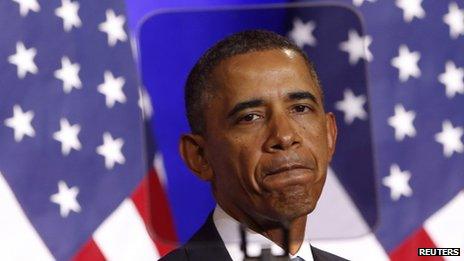Obama's NSA speech leaves more questions than answers
- Published

President Obama said he was ending bulk data collection in its current form - without spelling out what replaces it
The president opened up his big speech with a justification for spying on the British. Don't worry. It was a reference to the war of independence and Paul Revere.
His whole tone was rather academic; it was one of those sweeping speeches that are more like a long-form magazine article than a normal job of political persuasion.
But it was about persuading people - that he was balanced, judicious and had carefully weighed all the options.
Maybe so, but the conclusion was that he hadn't really reached a conclusion. At least not on what is perhaps the central question.
He said the collection of bulk data must go on; it hadn't been abused but it was understandable why it led to disquiet.
So he was ending it in its current form - without spelling out what replaces it.
He seems to have to rejected one suggestion - that the internet and phone companies should hold on to the data themselves - and has given the attorney general and the NSA 60 days to find a way to square the circle.
Congress will also be involved. "Over to you, Eric", is hardly the most inspiring conclusion to weeks of talking to everyone involved and after an official report making 46 recommendations.
His other main order is to end spying on friendly foreign leaders, unless there is a compelling national security reason. Most of his instructions have similar "get out of jail" cards attached.
Basically there's a lot of stuff he now says the NSA shouldn't do. Unless they think they ought to.
The president has not put a lid on this debate - indeed he rather has given the pot a vigorous stir.
What he's announced shouldn't upset the intelligence community - and is unlikely to greatly reassure civil liberties groups - but both sides will be left with more questions than answers.
- Published17 January 2014
- Published17 January 2014

- Published15 January 2014

- Published10 January 2014
